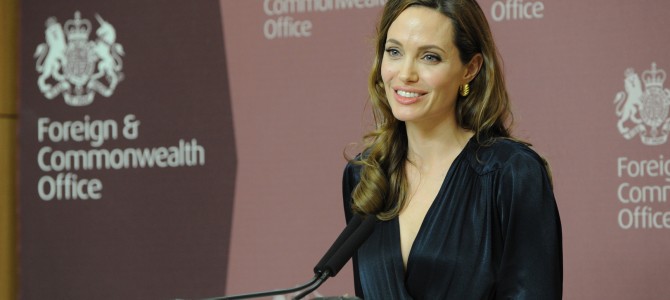Angelina Jolie wants us to talk about rape, but not in the Western-centric, man-blaming, feminist-professor way of the chattering classes.
She would like us to move beyond insular #YesAllWomen Twitter outrage to a global perspective with a broader, wiser understanding of the evils of human nature and the ability to overcome that evil with good.
Jolie stepped into this conversation way back in 2009 when she agreed to lend her considerable star power to a movie that explored rape in the context of a children’s story.
That movie became “Maleficent,” the blockbuster fairytale backstory dominating the domestic and global box office.
Jolie confirmed June 10 to the BBC that, as some had theorized, the wing-stealing scene does indeed refer to sexual violation.
“We were very conscious, the writer and I, that [the scene in question] was a metaphor for rape,” Jolie said.
The crucial scene depicts the fairy Maleficent meeting her human sweetheart. Motivated by ambition, he drugs her and cuts off her wings.
Hayley Krischer at the Huffington Post was shaken by this storyline: “This is the horrific side of rape culture. We’re so enmeshed in it that it’s impossible to ignore that a metaphorical rape occurs in a Disney movie.”
She shouldn’t be shocked. Rape has always existed and fairy tales have always been about dark topics, especially the perilous intersection of desire and danger. What does Little Red Riding Hood’s Big Bad Wolf represent other than a sexual predator? And what’s going on when Rapunzel thwarts her family’s attempted protection and lets down her hair?
In fact, Disney’s other recent hit, “Frozen,” also resonates with survivors of abuse.
The makers of “Maleficent” keep with ancient tradition by consciously referencing sexual abuse. But Jolie isn’t talking about rape culture, as defined by the current crop of American feminists. It’s no accident that her film rules the global box office just as she takes the stage to combat the idea of rape as an inevitable part of war.
Western women have it relatively good, she argued at the Global Summit to End Sexual Violence in Conflict on June 10-13 in London: “We must send a message around the world that there is no disgrace in being a survivor of sexual violence—that the shame is on the aggressor…We need to shatter that impunity and make justice the norm, not the exception, for these crimes,” Jolie said. “I have met survivors from Afghanistan to Somalia and they are just like us, with one crucial difference: We live in safe countries, with doctors we can go to when we’re hurt, police we can turn to when we’re wronged and institutions that protect us.”
In other words, Western women have what many women around the world do not: Tools to fight back. That’s hardly the word from the #YesAllWomen crowd.
Fighting back for justice has become one of the major themes in Jolie’s film projects. In addition to other projects about reconciliation and justice, she produced Difret, an Amharic-language film out of Ethiopia that has been making the festival circuit. It tells the story of a fourteen-year-old girl kidnapped by a man who wants to marry her, as is a custom there. As she defends herself, she kills him, only to find herself on trial for his murder. This film explores the boundaries between customary practice and law that attempts to change custom.
For Jolie, the story of rape does not end at the violation nor at fighting back. She goes further. “Maleficent” baffles victim-centric American feminists because instead of merely a story of victimhood or vengeance, it goes beyond both to become a story of rising above abuse and choosing to be better. As Jolie told the BBC, victims have a choice: “The core of [“Maleficent”] is abuse, and how the abused have a choice of abusing others or overcoming and remaining loving, open people.”
That message is increasingly the Gospel According to Saint Angie: Evil is complicated and must be stopped, but can only be overcome by good.








